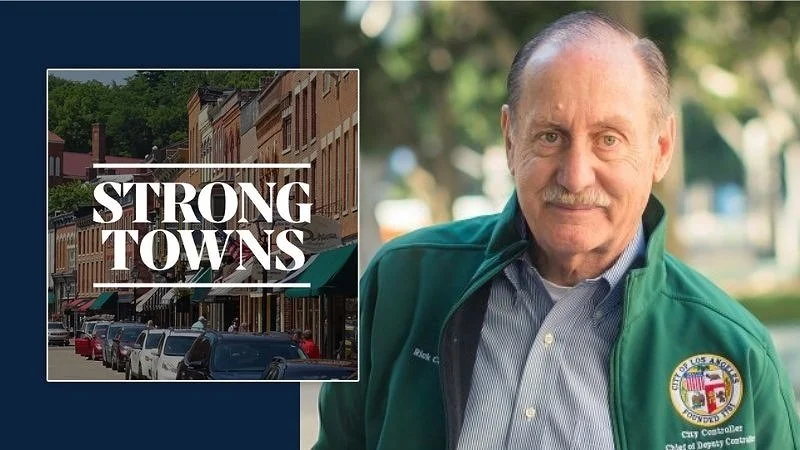Craig Cassar is a first-term city councilor in Hamilton, Ontario. He joins Tiffany to discuss the challenges his city faces and the progress it’s made. They also talk about the importance of synergy between urbanism and environmentalism.
Read MoreThe real liability isn’t doing something and getting blamed. It’s doing nothing and letting someone else die. You're protected. So do something.
Read MoreBecoming a Strong Towns member is taking a step from “I believe this” to “I am going to make this a reality.” Here’s how one city staff member decided to take the leap.
Read MoreChuck is joined by Carlee Alm-LaBar and Kevin Blanchard, former city staff members in Lafayette, Louisiana. They discuss the challenges of balancing competing demands and priorities when working in local government. (Transcript included.)
Read MoreCities slide into insolvency not with a dramatic collapse, but with a slow, steady drift into financial fragility.
Read MoreDuring a recent Planning Commission meeting in Windsor, California, Vice Chair Tim Zahner advocated for using the Strong Towns approach to make the city's streets safer.
Read MoreLocal officials often feel trapped, having to juggle large financial obligations with residents that resist tax increases. But delaying these tough decisions only makes them more painful and politically difficult. Bentonville, Arkansas, is experiencing that firsthand.
Read MoreHow do you direct city finances in a truly effective way? What role should the public play in a city’s financial decisions? Chuck and city finance expert Rick Cole cover these questions and more in this episode of the Strong Towns Podcast. (Transcript included.)
Read MoreChuck is joined by Shayne Kavanagh, senior manager of research for the Government Finance Officers Association. Kavanagh discusses the role of finance officers as “decision architects” and shares some tactics they can use to improve their processes. (Transcript included.)
Read MoreTravis Goedken is the city manager of Decorah, Iowa. He joins Norm to talk about the practices and reforms that are making Decorah strong, including making its budgeting easier to understand for residents and finding creative loopholes in restrictive state housing laws. (Transcript included.)
Read MoreAn overwhelming amount of information without context can be just as opaque as secrecy. That’s why transparency in city budgeting isn’t just about making numbers available — it’s about making them understandable. One city official in Maryland is making it his mission to do just that.
Read MoreDenver wants to repeal parking mandates citywide. This will help the city fight the housing crisis by reducing the costs and regulatory hurdles of development.
Read MoreFor years, housing production has systematically privileged corporate developers while shutting out everyone else. But cities are starting to change that. In Tennessee, this change is taking the form of a new process for preapproved plans.
Read MoreOn January 13, 2025, the city council of Bellingham, Washington, eliminated parking mandates citywide. This decision is a key step in reducing barriers to housing development.
Read MoreTo understand how one city leader can spearhead the housing reforms your city needs, look no further than Rebekah Kik, the deputy city manager for Kalamazoo, Michigan.
Read MoreCities across North America are recognizing the value of preapproved plans. Here’s why they’re so appealing and how their implementation is affecting cities.
Read MoreTulsa, Oklahoma, is joining a growing list of cities that have integrated preapproved plans into their housing toolkits. This approach makes it easier for small-scale developers to complete projects quickly and cheaply.
Read MoreThe South Dakota Legislature is considering implementing harsher penalties to deter drag racing on streets. This ignores the street design that allows people to drag race in the first place.
Read MoreIn this episode, Abby is joined by Chicago aldermen Matt Martin and Andre Vasquez to discusses the Western Avenue corridor study, one of the most ambitious planning efforts Chicago has seen in decades. (Transcript included.)
Read MoreParking regulations impose unnecessary restrictions on adding new housing. Many cities recognize this problem but struggle with how to address it effectively. Dubuque, Iowa, offers a real-world example of both the problems and an effective response.
Read More



















